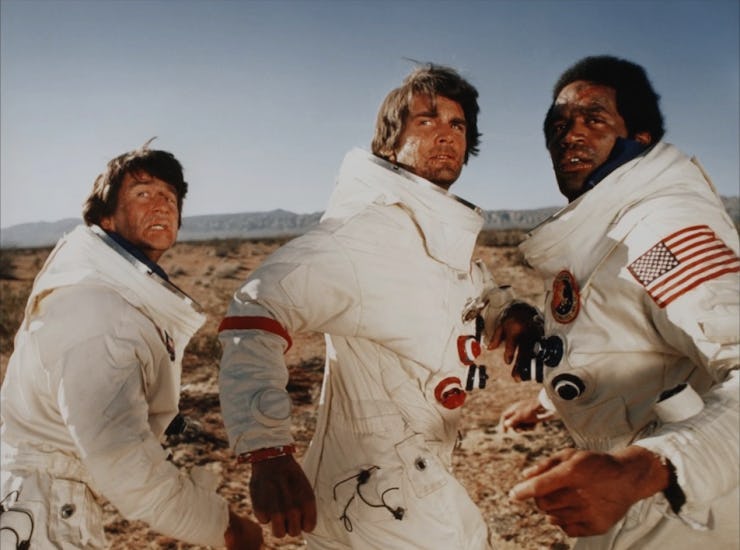45 years ago, an underrated sci-fi movie accidentally fueled a real-life conspiracy theory
Capricorn One isn't a horrible movie. As long as people remember that it’s not real.

What if Elon Musk faked a Mars landing? As the battle over misinformation wages in cyberspace, the idea of fringe conspiracy theories involving space travel can easily gain mainstream footing. Since 1976, unhinged claims that we never actually landed on the Moon have wormed their way into the zeitgeist in a variety of ways. And one film — which enjoyed an early release in Japan in December 1977 — accidentally helped ignite the casual belief in space-based conspiracy theories. Here’s why Capricorn One is actually a pretty good movie.
The premise of Capricorn One is essentially the outer space version of Wag the Dog (1997). In the film, NASA has successfully landed on the moon but can’t safely send astronauts to Mars. However, a public failure would mean losing all their funding. So NASA, in cooperation with the media, decides to fake it.
The movie isn’t exactly a comedy like the fake conflict in Wag the Dog was twenty years later, but Capricorn One isn’t a drama either. If there’s one thing that’s troubling it’s simply that at many points you’re wondering what it’s trying to say exactly. It’s not a super-on-the-nose satire like the classic Mr. Show sketch “Blow Up the Moon,” or Adam McKay’s proactive film 2021’s Don’t Look Up.
Instead, Capricorn One plays to a kind of post-Nixon deep cynicism for anything the U.S. was doing, regardless of political affiliations. As director Peter Hynes famously said, the purpose of the film was to push back on the kneejerk belief that anything anybody saw on TV was automatically real. “I grew up in the generation where my parents basically believed if it was in the newspaper it was true,” he told Empire in 2014. “That turned out to be bullshit. My generation was brought up to believe television was true, and that was bullshit too. So I was watching these simulations and I wondered what would happen if someone faked a whole story.”
As a thought experiment, Capricorn One feels delightfully transgressive, thrilling, and ultimately, a product of its time. In fact, had a fervent anti-science and anti-NASA sentiment not taken hold with other conspiracy theories, Capricorn One might be remembered more fondly.
There is an overwhelming amount of evidence that all the NASA moon landings happened, and that there’s no real reason to believe anything was faked for political purposes. But it’s possible that because Capricorn One was moderately successful, the bedrock of Moon-truther beliefs flourished in the decades that followed. Capricorn One was the biggest independent movie of 1978 (the year of its wider release). It wasn’t a huge blockbuster, but its influence is probably bigger than anyone realized at the time.
Faking the Mars landing in Capricorn One.
Capricorn One was a unique 1970s sci-fi movie that suggested the real events were, in fact, science fiction. It posits an untrusting worldview, and skepticism that is both artful and exciting. The only reason it’s not a classic is that trolls essentially hijacked its premise and took this fiction to be a kind of blueprint for conspiracy theories. Asking “what if?” questions in science fiction can be amazing. But the accidental cautionary tale of Capricorn One is to remember that the answer to the “what if?” question doesn’t always have to be a complex cover-up.
Funnily enough, if you Google the “Capricorn One release date,” the inconsistent data might make you think the movie itself is a hoax. Although Google thinks the movie came out on December 17, 1977, there’s no evidence to suggest this was the case. Instead, the U.S. release date was June 2, 1978. The Japanese release date of December 10, 1977, was the earliest time it hit theaters, but despite the internet's claims to the contrary, the movie didn’t come out on December 17, 1977.
See, Capricorn One is right — you can’t trust everything you see and read, sometimes it’s wrong!
Capricorn One is streaming for free on Peacock, Tubi, and Pluto.
This article was originally published on